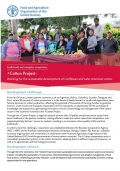Success stories

02 Mar 2020
SSTC represents an opportunity for the exchange of knowledge and experiences, generating innovation in terms of technology and management of the cotton sector in the countries involved in the +Cotton Project.
Through the +Cotton Project, a regional network of more than 70 public and private sector actors have been mobilized in the partner countries, uniting efforts to make the cotton value chain competitive, and supporting family farmers’ access to markets, resulting in an increase in their quality of life and their livelihoods.
14 Jul 2017
As global population soars and various climate and environment challenges emerge, food and nutrition security remain a distant reality for many populations in the rural world. In rice production areas, overuse of pesticides and chemical fertilizers decreases terrestrial and aquatic biodiversity while negatively impacting human health. While using fertilizer and pesticides increases productivity in the immediate term, over the long term it contributes to a loss of aquatic and terrestrial biodiversity, negative health impacts due to direct exposure to toxic pesticides and contaminated water, pest resurgence, degradation of natural resources and decreases in production. Moreover, aquatic biodiversity from rice-based ecosystems,...
23 Nov 2016
Interview with Carlos Watson, Team Leader, South-South Cooperation, FAO, on the online platform aimed at facilitating cooperation among the global south.
23 November 2016, Rome. Widely known as the “Gateway”, this tool developed by FAO fosters support to South-South Cooperation by putting southern expertise and national capacities at the reach of FAO Member countries. The Gateway also gives great visibility to the existing national expertise and facilitates solution exchanges. 35 institutions from 11 countries have joined the platform since it was launched in 2015. We talked to Carlos Watson about this ‘marketplace-like’ tool that matches Southern Expertise and needs.
How would you...
26 Oct 2016
African countries yield positive results thanks to the Purchase from Africans for Africa initiative, that adapts the Brazilian successful school feeding model and public food procurement from family farmers
20 October 2016, Rome. Since 2014 Brazil no longer features on the World Hunger Map. Its powerful National School Feeding Programme, within the framework of the national Zero Hunger programme, has been key in eradicating hunger. Its valuable experience is now being shared with African countries through South-South Cooperation in order to adapt the approach to their local realities.
Brazil’s successful model, which goes beyond providing school meals...
13 Apr 2016
Five years ago, a programme was launched in Latin America and the Caribbean with the goal to provide students with nutritious food, promoting food and nutrition education, and stimulating the local economy. The “Strengthening School Feeding Programmes in the Framework of the Hunger Free Latin America and the Caribbean 2025 Initiative” began with the collaboration of five countries, and today the number has grown to 14.